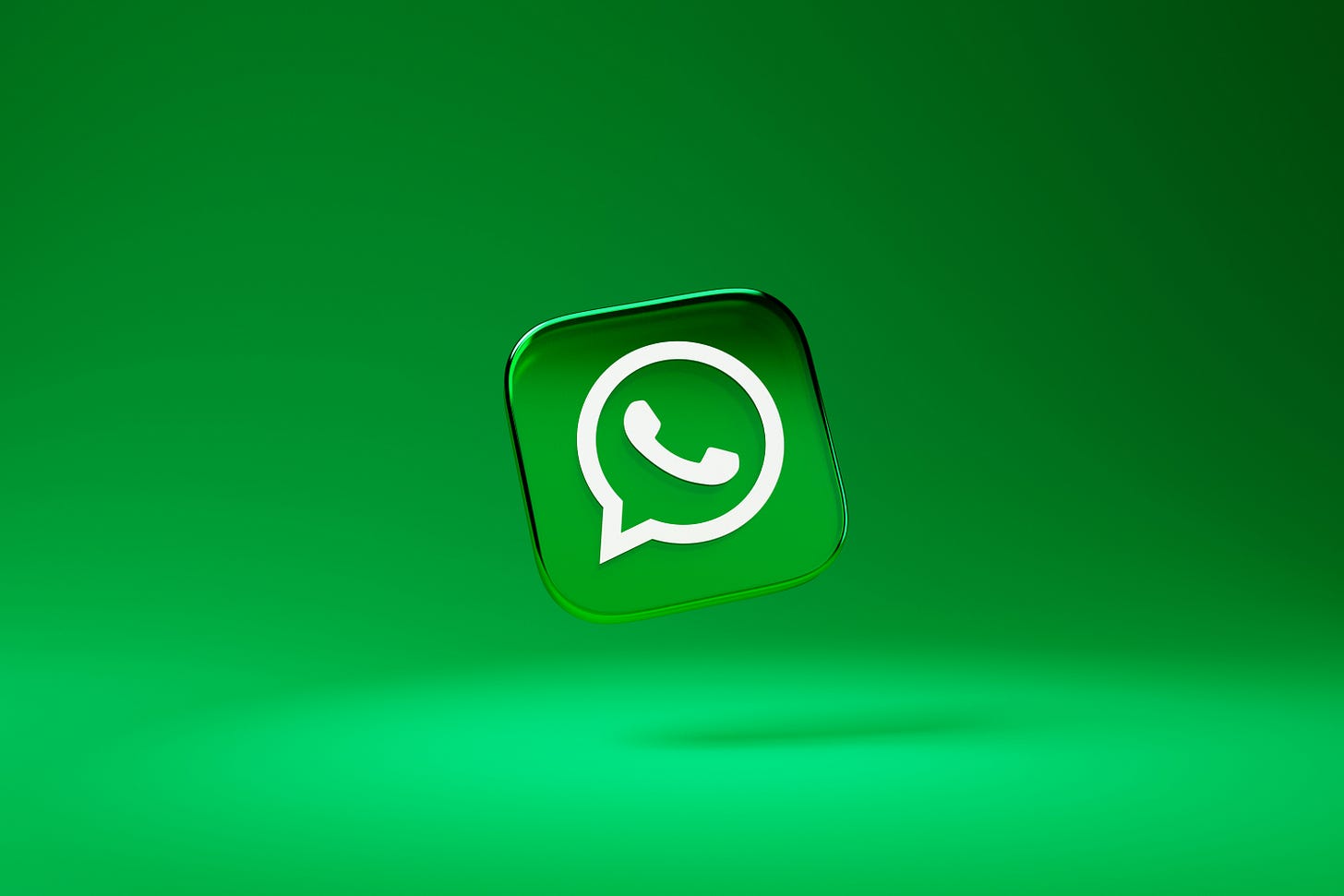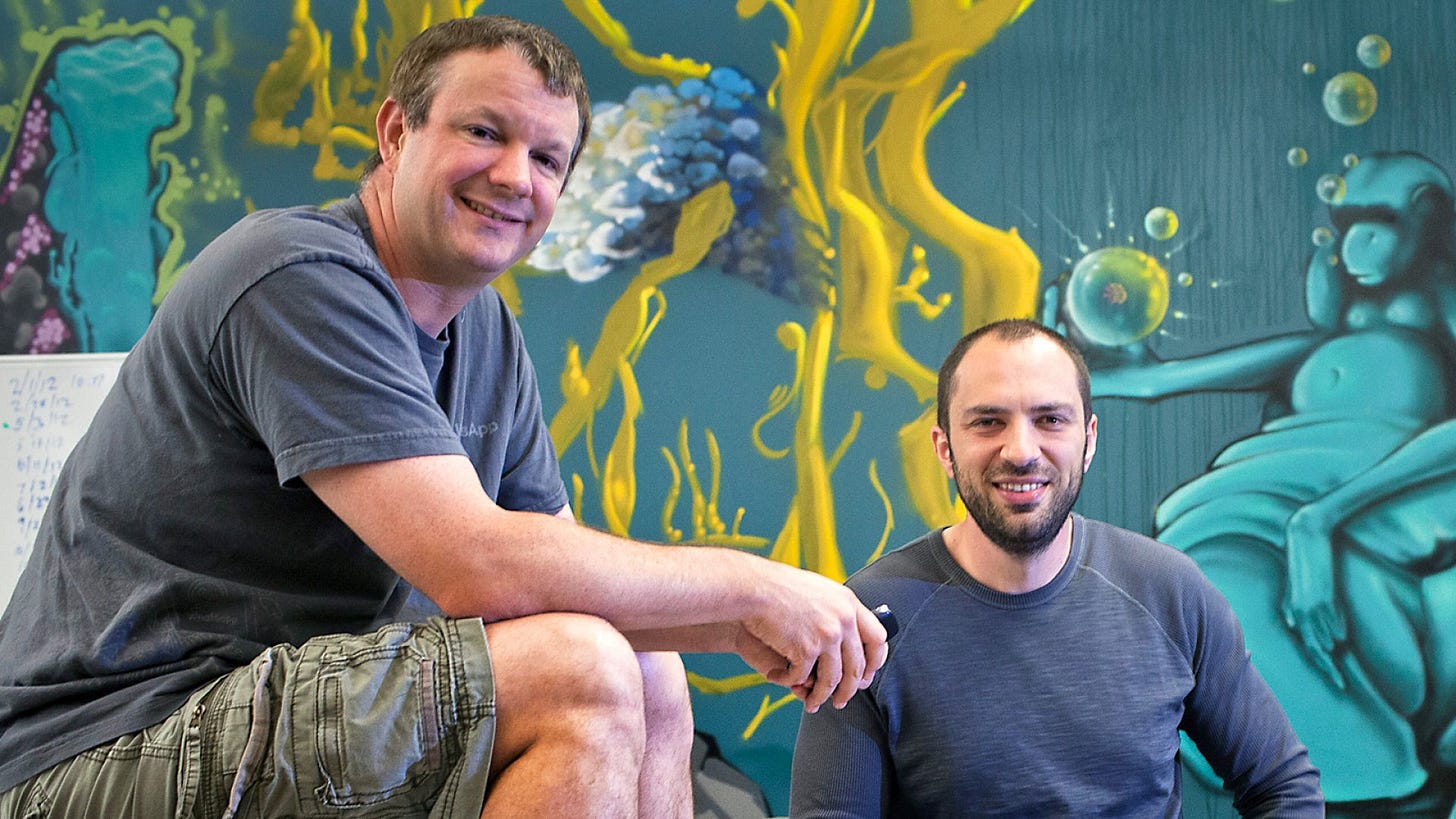The Simple App That Beat Every Tech Giant
Why WhatsApp's "boring" design choice made it worth $19 billion (and why I still choose it over everything else)
A story about two guys who got rejected by Facebook, then sold them an app for more money than most countries' GDP
Here's something weird that happened to me recently. Three months ago, I completely deleted Facebook from my phone. Just... gone. Cold turkey.
My entire family lives on Facebook. My college friends post their life updates there. My neighborhood community group organizes everything through Facebook. But I couldn't take it anymore. The endless scroll of outrage, the algorithm pushing content that made me angry, the constant mental noise it was destroying my peace of mind.
So, I switched my social media to Twitter (sorry, X), LinkedIn for work stuff, and Substack for actually learning things. But here's the kicker: I kept WhatsApp. Even though Facebook owns it. Even though I literally work in tech and know dozens of "better" messaging apps.
Why? Because WhatsApp feels completely different. It's like the calm, reliable cousin of the Facebook family who just gets the job done without drama.
And that's exactly what Jan Koum and Brian Acton planned all along.
Two Guys, One Rejection, Nineteen Billion Dollars
It's 2009. The iPhone is barely two years old. Two guys in their thirties are sitting in a coffee shop in Silicon Valley, unemployed and honestly pretty bummed out.
Jan Koum, a Ukrainian immigrant who learned English by returning used computer manuals to bookstores after reading them (because he couldn't afford to keep them), had just been rejected by Facebook for a job. His buddy Brian Acton? Also rejected. By both Facebook AND Twitter.
Most people would've taken this as a sign to find a "real job." These two decided to build something that would eventually make Facebook pay them $19 billion dollars.
But the story gets better. Koum didn't even start with messaging. His first version of WhatsApp was basically a digital status board. You could tell your contacts "I'm at the gym" or "In a meeting" and that was it. Revolutionary? Hardly.
Then Apple launched push notifications, and everything clicked. Koum realized people didn't want another social network they wanted to actually communicate without all the noise.
The Genius of Being Boring
WhatsApp succeeded because it was aggressively, intentionally boring. While every other app was adding features faster than you could learn them, WhatsApp asked one simple question: "Does this help people send messages better?"
If the answer was no, they didn't build it.
Think about this for a second. When was the last time you opened WhatsApp and felt overwhelmed? When did you last see an ad that made you angry? When did the app ever try to keep you scrolling for "engagement"?
Never. Because WhatsApp treats your attention like it's precious.
The Five Rules That Changed Everything
1. Feel Like Part of Your Phone Ever notice how WhatsApp doesn't have its own weird design language? It looks like it belongs on your device, whether you're on iPhone or Android. No bright colors screaming for attention. No custom fonts that look "cool" but are hard to read. It just... fits.
2. Every Pixel Has a Job Open WhatsApp right now. Look around. Every button, every icon, every space between elements serves a purpose. There's no decoration for decoration's sake. It's like a well-organized toolbox everything you need, nothing you don't.
3. Speed Beats Everything You know that feeling when you hit send and your message just... goes? No loading spinner. No "sending..." status that hangs forever. WhatsApp prioritized speed over fancy animations. Your grandmother in a rural village with slow internet can still send messages instantly.
4. Same Experience Everywhere Whether you're using WhatsApp on your phone, computer, or tablet, it works the same way. No learning curve. No "desktop version" that's missing half the features. Consistency builds trust.
5. Your Privacy Isn't For Sale Here's the big one: WhatsApp doesn't read your messages to show you ads. End-to-end encryption means even WhatsApp can't see what you're saying. In a world where every app is trying to monetize your data, this was radical.
The Magic of Saying No
The hardest part of building anything isn't deciding what to include it's deciding what to leave out. WhatsApp became a master class in strategic rejection.
No timeline. No public posts. No algorithmic feed. No ads (initially). No games. No shopping. No stories (until much later, and even then, minimal). No business profiles trying to sell you stuff in every conversation.
Every feature request became a philosophical battle. The founders had a simple test: "Does this make messaging faster, more reliable, or more private?" Three criteria. That's it.
This created something magical: network effects without the drama. Your mom could invite your entire extended family to a group chat, and instead of political arguments, they'd just share photos and coordinate dinner plans.
Why I Choose WhatsApp Over Everything Else
I've used Telegram (too many features I don't need). I've endured Messenger (feels too much like Facebook).
But WhatsApp just works. My 56-year-old dad uses it to send voice messages. My teenage cousin uses it for group projects. My international friends use it because it works everywhere.
It's the messaging app equivalent of a Toyota Camry not the flashiest option, but you know it'll get you where you need to go without breaking down.
What Every Startup Can Learn from This
Start with One Thing and Do It Perfectly
WhatsApp started with status updates, pivoted to messaging, and perfected that. They didn't try to be the "everything app" from day one. Find your core value and nail it before adding anything else.
Constraints Force Creativity
Koum and Acton had $250,000 in funding. That's pocket change in Silicon Valley. But limited resources forced them to focus only on what mattered. Sometimes the best thing that can happen to your startup is not having enough money to build everything you want.
Design for Your Grandmother
If your app needs a tutorial, you've already lost half your potential users. WhatsApp's interface was so simple that people who'd never used smartphones before could figure it out in minutes.
Question Every Feature
Before adding anything new, ask: "Does this make our main thing better, or does it just make us feel productive?" Most features fail this test, but most founders add them anyway.
Respect People's Time and Attention
In an economy built on stealing attention, the apps that give it back win. WhatsApp doesn't try to be addictive. It helps you communicate and gets out of your way.
The Billion-Dollar Philosophy
Here's what Koum and Acton understood that most tech founders miss: People don't want more features. They want less friction.
They don't want more ways to connect. They want better ways to communicate with the people who already matter to them.
They don't want to be entertained by their messaging app. They want to get their message across and move on with their lives.
WhatsApp became worth $19 billion because it solved a real problem without creating new ones. In a world of digital noise, it offered silence. In a landscape of feature bloat, it offered simplicity. In an attention economy, it offered respect.
The Plot Twist
The craziest part? Facebook the company that rejected both founders ended up paying them more money than most companies are worth to acquire their "simple" messaging app.
Mark Zuckerberg knew what I learned during my Facebook detox: sometimes the most valuable thing you can build is something that doesn't fight for attention. Something that serves people instead of serving itself.
WhatsApp proved that in a world obsessed with growth hacking and engagement metrics, sometimes the best strategy is just being genuinely useful.
Your Turn
As I'm writing this on my laptop, I've got WhatsApp Web open in another tab. No notifications fighting for my attention. No algorithm deciding what I should see. Just my actual conversations with actual people I care about.
That's the lesson every startup founder should tattoo on their forehead: build something people actually want to use, not something that wants to use people.
The next time you're tempted to add "just one more feature" to your product, remember that two guys who got rejected by Facebook became billionaires by perfecting the art of subtraction.
Sometimes the most revolutionary thing you can do is be boring.
Here are some more WhatsApp-related sources you might enjoy exploring








